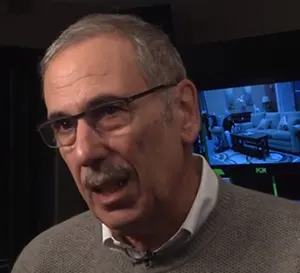Published on: April 14, 2025 at 7:21 pm
By Daniel Butcher
People who can approach job searches with a flexible mindset about their professional identity are better able to bounce back after devastating job losses or even injuries that affect the types of jobs they’re able to do.
Academy of Management Scholar Dean Shepherd of the University of Notre Dame said that if people get fired or laid off, butt heir job is not a critical part of their identity, then they can often recover relatively quickly. But many people’s self-image is intertwined with their career.
“If you can find a job that’s kind of related to that identity, then you’re probably going to be fine, but if it was a strong part of your identity and you’re unable to capture a job that represents that identity, then you can fall a long way,” Shepherd said.
“But the interesting aspect is that when you hit rock bottom, it’s actually quite freeing—it’s like freedom when you hit the bottom, because you say, ‘It can’t get any worse,’ and suddenly, when you hit the bottom, you actually start to think more freely and can engage in this identity play,” he said.
Research on musicians and dancers who have experienced traumatic events uncovered surprising findings about self-reinvention and reimagining one’s professional identity to achieve growth in a new career.
“Professional musicians and dancers who have an injury and can no longer perform those roles that they’ve been performing their whole life and was a strong part of their identity, and also people who get injured and have become paraplegics or even quadriplegics, after a while, they can actually perform well in a different career, and they look back and say, ‘The best thing that ever happened to me was getting that injury,’ Shepherd said. “It wasn’t at that time, of course; it was devastating, but it allowed them to go and pursue something else, and that something else became what they felt was actually something better than what they were before.
“In some ways, maybe it’s better, or maybe they’re just telling themselves it was better, but either way, that’s a good thing that happened or at least a silver lining,” he said. “So I suppose that’s the advantage—when we hit rock bottom, then we can start to really pursue something else—we can play with these different identities and find something that may actually lead to an outcome that’s better than what would have happened if we had never lost that original career in the first place.”
Of course, for some, there’s a sad side to that kind of story.
“Some people engage in chronic dysfunctional behavior and take drugs and remove themselves from society and their own way of thinking after suffering a professional setback or injury,” Shepherd said. “But if you can engage in this identity play, then you can maybe find a better version of yourself.”
-
Daniel Butcher is a writer and the Managing Editor of AOM Today at the Academy of Management (AOM). Previously, he was a writer and the Finance Editor for Strategic Finance magazine and Management Accounting Quarterly, a scholarly journal, at the Institute of Management Accountants (IMA). Prior to that, he worked as a writer/editor at The Financial Times, including daily FT sister publications Ignites and FundFire, as well as Crain Communications’s InvestmentNews and Crain’s Wealth, eFinancialCareers, and Arizent’s Financial Planning, Re:Invent|Wealth, On Wall Street, Bank Investment Consultant, and Money Management Executive. He earned his bachelor’s degree from the University of Colorado Boulder and his master’s degree from New York University. You can reach him at dbutcher@aom.org or via LinkedIn.
View all posts
Tagged #Resilience #PersonalGrowth #CareerDevelopment #IdentityFlexibility, career change, career identity, career setback, fired, identity play, job change, layoffs, professional identity, restructuring, trauma
Up next....
The Employee-Employer Relationship Has Changed for the Worse
Source: Shutterstock
By Nick Keppler
In one recent survey, 54 percent of hiring managers at technology companies said they expect layoffs in 2025 as more tasks are performed by AI. Although U.S. President Donald Trump’s tariff plans have been delayed and mitigated by a growing list of exemptions and ongoing negotiations between the U.S. and targeted countries, tariff-related price uncertainty and shipment delays have created a wave of stagflation anxiety and recession fears in the U.S., which could spur companies to slash jobs, which in turn would worsen the growing economic crisis.
Academy of Management Scholar Herman Aguinis of the George Washington University School of Business said that a few decades of mass layoffs and wages not keeping up with inflation have fundamentally changed the employee-employer relationship in the U.S. When looking to improve the bottom line, companies often eye trimming payroll because it is such a huge expense.
“For many organizations, the lion’s share of the operating budget is payroll, two-thirds or more,” Aguinis said. “It could be 80 percent or 85 percent.”
The cost-cutting approach that sees employees as expenses more than assets can be shortsighted, he said. Moreover, many companies lack an effective performance management system and, in mass layoffs, cut high-performing and low-performing employees alike.
Since the 1990s, when companies, particularly in the tech sector, regularly pruned their workforce as a cost-saving measure, despite a booming economy, much of the workforce has begrudgingly come to accept that they can lose their job in a corporate reshuffling, regardless of their job performance. Aguinis said this has damaged the psychological contract between employee and employer that engendered mutual loyalty.
“In the post-World War II era, it was understood that if you do your job, you will not be fired, and you will also not leave, even if they pay you a little more somewhere else,” he said. “We had this implicit loyalty in the old psychological contract.”
Under the new employment-at-will standard, there is no psychological contract, and most employees are always tabulating their value and waiting for the ax to fall.
“If you’re not adding value to your company, they can fire you at any time,” Aguinis said. “On the flip side of the coin, if you’re a star performer and adding a lot of value, you get offers, and you can just go to a new employer willing to pay you more overnight, and there’s no loyalty from you to the company.”
As economic anxiety causes people to rethink their employment, companies should do more to identify and retain their most valuable players, Aguinis said.
“You have to implement a very good performance-management system so you know who your highest-performing people are, because they can leave at any time—and if they leave, it will be tough to replace them,” he said. “For example, in May 2025, Google announced they are revamping the performance management and compensation system so that the total compensation pool will remain budget-neutral, but it will include larger rewards for top performers and smaller bonuses for lower-rated individuals.”
This awareness of the importance of adding value also cycles into the advice Aguinis gives MBA graduates. Instead of taking the job offer that pays the best, he said to look for career-development opportunities.
“Pick the employer that gives you the most amount of learning opportunities, because that is an investment in your future, not just in the short term,” Aguinis said.
-
Nick Keppler is a freelance journalist, writer, and editor. He has written extensively about psychology, healthcare, and public policy for The New York Times, The Washington Post, Slate, The Daily Beast, Vice, CityLab, Men’s Health, Mental Floss, The Financial Times, and other prominent publications (as well as a lot of obscure ones). He has also written podcast scripts. His journalistic heroes include Jon Ronson, Jon Krakauer, and Norah Vincent.
Before he went freelance, he was an editor at The Houston Press (which is now a scarcely staffed, online-only publication) and at The Fairfield County Weekly (which is defunct).
In addition to journalism, he has done a variety of writing, editing, and promotional development for businesses and universities, including the University of Pittsburgh and Carnegie Mellon University, and individuals who needed help with writing projects.
View all posts
Up next....
Going Beyond Surface-level Diversity Key to Avoiding Bias
Source: Shutterstock
By Nick Keppler
Spurred by the racial reckoning after the 2020 police murder of George Floyd, many large, public-facing companies in the U.S. implemented diversity, equity, and inclusion (DEI) programs with the stated goal of addressing their own barriers to hiring of, and advancement for, historically disadvantaged groups.
Too often, these efforts are only aimed at what Academy of Management Scholar Herman Aguinis of George Washington University calls “surface-level diversity,” the presence of people of different races, ethnicities, genders, and other classifications without a change in corporate culture led by executives who value varying perspectives.
“Deep-level diversity is when you have people around the table who bring different experiences and opinions and perspectives to the table, and organizational leaders listen to those diverse voices,” Aguinis said, who has both researched and consulted on institutional barriers that prevent the rise of “star performers” from various backgrounds.
“Surface-level diversity is when you look at someone’s gender, skin color, or race or ethnicity, and that’s what you call diversity,” he said. “It’s much easier to go for surface-level diversity.”
This gravitation towards superficial diversity often starts at the recruitment and interview stages. People in charge of hiring tend to like people with views and appearances similar to their own, said Aguinis, and they can slip into looking for candidates who have the same race, ethnicity, gender, and background as they do.
To prevent bias from creeping into the recruitment and hiring processes, Aguinis recommends conducting structured interviews.
“In a structured interview, you ask the same questions to all the candidates, and you actually score the answers with a scoring key you have created in advance,” he said. “If you have an unstructured interview, where you just chit-chat with a candidate, you’re more likely to like them or not, based on how similar they are to you.
“Also, you should never have just one interviewer because that person’s biases are more likely to be undetected.”
Aguinis added that the perception of a superficial quota system is one cause of a backlash that has led many companies to roll back or rebrand DEI efforts.
“When companies use it—the shortcut of surface-level diversity and just trying to use quotas or things like that—that’s when the diversity seems to be the opposite of what it tries to do: being exclusive instead of inclusive,” he said.
-
Nick Keppler is a freelance journalist, writer, and editor. He has written extensively about psychology, healthcare, and public policy for The New York Times, The Washington Post, Slate, The Daily Beast, Vice, CityLab, Men’s Health, Mental Floss, The Financial Times, and other prominent publications (as well as a lot of obscure ones). He has also written podcast scripts. His journalistic heroes include Jon Ronson, Jon Krakauer, and Norah Vincent.
Before he went freelance, he was an editor at The Houston Press (which is now a scarcely staffed, online-only publication) and at The Fairfield County Weekly (which is defunct).
In addition to journalism, he has done a variety of writing, editing, and promotional development for businesses and universities, including the University of Pittsburgh and Carnegie Mellon University, and individuals who needed help with writing projects.
View all posts
Up next....
Rethinking Management in the Age of AI
Source: Shutterstock
By Jason Collins
More than one in four workers are worried that AI will lead to job losses, according to a recent poll from the conciliation service Acas. Currently, leaders and management have a key role in shaping how employees use AI during this technological transition.
Instead of viewing AI as a potential replacement for human workers, management can be more effective by considering how people can interact with technology to boost productivity and efficiency. Academy of Management Scholar Wendy Smith of the University of Delaware said that doing so requires that senior management shift their mindsets to frame the relationship between humans and AI in the context of what works in their organization.
“One of the roles of leaders is to understand how AI and humans work together,” Smith said. “We tend to think of how technology will replace human, which is an either/or mindset.”
Instead, she urged leaders to frame technology as a complement to, not a replacement for, employees.
“Leaders can adopt a both/and approach, exploring how AI and employees work together to lead to even better outcomes,” Smith said.
Smith advised management to adopt the mindset of using AI to make their team members’ jobs easier and free up time for them to focus on strategic planning and other tasks that require higher-order thinking.
“AI works better because the person and the technology are in a relationship with one another,” Smith said. “We can do better when we ask ourselves, ‘What is this technology good for? What is my level of understanding of it? What am I good for, what do I do well, and how could I work effectively and interdependently with this technology?’”
Smith said that she believes that while AI can perform certain tasks more efficiently than humans, it ultimately comes down to collaboration. For example, the better the prompts that humans give to a generative AI platform, the better the outputs of the gen AI software. Human expertise can help evaluate and assess the quality of the AI responses.
“If AI is going to work to the best of its capabilities, it’s because I bring real and important contributions to the table,” Smith said.
For managers, the question is no longer whether to use AI but how to grow with it and encourage rank-and-file employees to do the same. Smith said this will require “growth and thoughtfulness.” Smith also underscored the advice for people to “recognize that AI and humans work better together, and to be in learning and growth mode.”
Up next....
Human-Centered Leaders Steer Through the AI Anxiety Curve
Source: Shutterstock
By Jason Collins
Established generative AI platforms such as OpenAI’s ChatGPT, Google’s Gemini (formerly Bard), Anthropic’s Claude, and Jasper (formerly Jarvis) have been competing for users and market share, and the level of competition in the space will continue to grow with the rise of non-U.S. AI startups, including Chinese company DeepSeek. The impact of this new technology in the workplace is far-reaching, and leaders need to guide their organizations’ employees through their psychological resistance with an approach that embraces innovation while acknowledging the potential positive and negatives effects on humans and our emotions.
Academy of Management Scholar Wendy Smith of the University of Delaware noted that history has shown us that when a new generation of technology is introduced, such as generative AI, we resist it psychologically. Smith explained that AI is a great example of this.
“AI introduces all kinds of uncertainty and possibilities, some exciting, others anxiety-inducing,” Smith said.
“It’s a wide range of possibilities, which includes automation of manual tasks, role changes, and job losses, and that type of uncertainty leads us to psychologically fill in the gaps with all kinds of things that we’re afraid of,” she said.
It introduces the question, “What happens with the people who had been doing the work but whose skills are no longer relevant or up to date?”
This AI anxiety curve is not a new concept. Smith cited the introduction of once-disruptive technologies that we now take for granted.
“We’ve seen that story play out in every industry,” Smith said. “For example, we’ve seen how the introduction of the personal computer overtook the mainframe, and the introduction of cloud computing overtook the personal computer.
“We’ve seen it in the past, and when it comes to technology in general is, as a result of this anxiety, there’s this curve of people adopting the anxiety,” she said.
Smith noted that this spread of emotional reactions results in a wave of people, especially in the workplace, feeling this anxiety and thus holding out for the new technology to become more established before gauging its implications, or dismissing its potential to create positive outcomes. Leaders cannot afford to ignore this anxiety. If they are to continually innovate, they need to take into account employees’ emotional responses.
“Effective innovation requires attention to, not rejection of, employees’ emotional experiences,” Smith said.
“The best leaders navigate this learning and adoption curve across the organization with empathy for their workers and clarity on the objectives for deploying the technology with a human-centered approach to leadership that also embraces innovation,” she said.
Up next....
Trump Administration Policies Have Chilling Effects on Academia
Harvard Yard in the winter. Source: Shutterstock
By Paul Friedman
Tighter enforcement of immigration regulations and cuts in research grants under the Trump administration are having negative impacts on academic work in general and on not-for-profit professional associations, including the Academy of Management, in particular.
Academy of Management (AOM) Scholar Peter Bamberger of Tel Aviv University, the president of AOM, says you can see it clearly in the run-up to the AOM’s annual meeting in Copenhagen. Among other issues, there is concern about how the visas of foreign students are being treated by authorities such as U.S. Immigration and Customs Enforcement (ICE).
“A good number of the research papers that have been accepted for presentation come from doctoral students from the United States; many of the doctoral students in the United States are foreign doctoral students; and some of the foreign doctoral students in management in the U.S. are considering the potential costs of leaving the U.S. to present their paper,” Bamberger said.
“We are concerned that some of these foreign Ph.D. students, rather than taking that risk, may opt to stay at their offices in the USA and not present their research, which would obviously be deleterious to our science,” he said.
“It would be very unfortunate if innovative papers and important findings are not presented at the 2025 conference because foreign U.S.-based scholars are concerned about the validity of their visas.”
Bamberger said he doesn’t know any AOM members whose students have been deported, but he does know that some AOM scholars are among those being hit by cuts in federal funding for research.
“Those individuals who had grant money to study diversity, equity, and inclusion—that’s all gone,” Bamberger said. “Those individuals don’t have the grants anymore and as a result, the research stops.
“Now, it’s the right of a government to determine how it wants to allocate funding for research, so I can’t necessarily say that this is something that’s undemocratic or unfair,” he said. “That was the result of the election, but it is having a problematic effect.”
Bamberger said he sees an ironic example of how cuts in research can have unexpected results.
“A lot of that research on DEI is not necessarily pro-DEI,” he said. “For example, my own research on gender and racial pay equity suggests that contemporary policies oriented towards enhancing the equity have significant unintended negative consequences, including compensation compression.
“So when you cut off the funding for all research that mentions certain keywords assumed to be related to DEI, you’re cutting off the funding of people doing research that indicates problems with DEI policy, as well as perhaps supporting policies that may be favored by certain politicians.”
-
Paul Friedman is a journalist who worked for 45 years at the three major news networks. He began as a writer and reporter and then became a producer of major news broadcasts, including Nightly News and the Today show at NBC, and World News Tonight with Peter Jennings at ABC. He also served as Executive VicePresident of News at ABC and CBS. Later, he taught journalism as a professor at Columbia University, New York University, and Quinnipiac University. Friedman is now semi-retired and lives with his wife in Florida.
View all posts
Up next....
AI Is a Tool to Boost Efficiency, Not to Reduce Headcount
Source: Shutterstock
By Paul Friedman
Artificial intelligence is often seen as a threat to employment, but it can be used to preserve jobs in times of uncertainty such as the current one when many economists are sounding the alarm about a looming recession.
Academy of Management Scholar Peter Bamberger of Tel Aviv University said AI can be used to help businesses maintain skilled workforces when they may have to find ways to cut costs.
“What kind of jobs may disappear? What kinds of skills will you still need? What skills can we do without? There’s uncertainty there,” Bamberger said. “Perhaps you want to take that workforce and upgrade them over time.
“You have to know where your business is going and have a good sense as to what kinds of competencies you need,” he said. “There are clearly benefits to retaining your workforce as long as you can afford to train them to augment the AI and enhance its value.
“Increasingly organizations are doing this and using AI in this process.”
Bamberger said AI is now allowing organizations to better understand how to leverage and develop the talent in their workforce.
“Often we refer to something called the talent marketplace, something that organizations probably should have been doing decades ago, which is keeping inventories of their workforce’s competencies and skills,” Bamberger said. “AI is enhancing the ability of organizations to leverage the workforce they have in place by moving people around on short-term internal gigs in organizations and getting them prepared for positions that might open up in the future.
“These are systems that help organizations enhance the competency level of their workforce and limit the need to necessarily turn to the external labor market to secure the talent they need, which can be quite expensive,” he said.
“Ultimately it may offer a far more economical way to maximize the return from investments in human capital.”
There’s also a benefit of AI to employees, according to Bamberger.
“AI—having an understanding of the individual’s background and experiences and skills and competencies—can search through a wide range of projects that may require a month or two of work and then propose those to an employee during that individual’s slack time that they take on this additional project,” he said.
“And if they do enough of these projects over the course of two or three years, they’re going to be set to fill these new roles that they’re interested in doing and the organization needs them to fill.”
-
Paul Friedman is a journalist who worked for 45 years at the three major news networks. He began as a writer and reporter and then became a producer of major news broadcasts, including Nightly News and the Today show at NBC, and World News Tonight with Peter Jennings at ABC. He also served as Executive VicePresident of News at ABC and CBS. Later, he taught journalism as a professor at Columbia University, New York University, and Quinnipiac University. Friedman is now semi-retired and lives with his wife in Florida.
View all posts
Up next....
How Looming Stagflation May Affect Pay
Source: Shutterstock
By Paul Friedman
At a time when some forecasts predict continuing or worsening inflation or stagflation and possibly a recession, pay transparency adds to the pressure on organizations’ decision-makers.
Peter Bamberger of Tel Aviv University, an Academy of Management scholar who published a book based on his research on pay transparency, said managers will need to build systems of compensation that are more justifiable and understandable to employees.
“The first step with pay transparency is not necessarily to disclose pay levels of one employee or another employee, but rather to disclose how pay is determined in the organization,” Bamberger said. “Most employees have no understanding whatsoever how their pay is determined in the organization and how other people’s pay is determined in the organization.
“Simply understanding pay processes and procedures, all the evidence suggests, has beneficial effects for both employees and employers with very few, if any, side effects—except that employers have to work harder to build these equitable and fair systems.”
Bamberger said pay transparency is always problematic for decision-makers.
“No one wants their decisions to be transparent to other people—transparency is great when we are the observers, but when we’re the observed, it’s a terrible thing,” Bamberger said. “It comes with potentially unintended negative consequences, especially when you have to think about what happens when people see that they are paid less than other people.
“It becomes problematic for the ones making the decisions, and it can be problematic for the organization,” he said. “So there are complications with pay transparency; there’s no question about it.”
Still, Bamberger said he believes that “sunshine is the best antiseptic,” and pay transparency can produce surprising positive results.
“What the evidence shows is that most employees underestimate how much their superiors are making, and when you think about that, it generates a tendency of individuals to think that they’ll do better by leaving their current organization,”
Bamberger said. “The grass is always greener; if I want a pay increase, I have to go outside, and that movement has costs to the current employer.
“So there’s merit, potentially, in letting people see what the potential income might be for moving up within the organization,” he said.
“I think organizations that are forced to be more accountable and hence build more effective pay systems—more explainable and justifiable pay systems—ultimately enhance the quality of the human capital they can bring in and hold to enhance their competitiveness, which becomes really important in a period of stagflation.”
-
Paul Friedman is a journalist who worked for 45 years at the three major news networks. He began as a writer and reporter and then became a producer of major news broadcasts, including Nightly News and the Today show at NBC, and World News Tonight with Peter Jennings at ABC. He also served as Executive VicePresident of News at ABC and CBS. Later, he taught journalism as a professor at Columbia University, New York University, and Quinnipiac University. Friedman is now semi-retired and lives with his wife in Florida.
View all posts
Up next....
Everyone Will Suffer in the Wake of Trump Administration’s Research Cuts
Source: Shutterstock
By Paul Friedman
This year, the Trump administration has fired many government researchers, canceled scientific and medical research grants, and targeted leading universities, including Harvard, with debilitating funding freezes. Fear of reprisal has caused many scientists, doctors, professors, and university administrators to opt for silence instead of speaking up to defend the research that is getting the ox.
Academy of Management (AOM) Scholar Peter Bamberger of Tel Aviv University says much of the research produced by him and his colleagues, including many AOM members, has a day-to-day impact on industry practitioners, including organizational leaders and managers. Cuts in federal funding for research will have a negative impact on industry, as well as researchers, colleges and universities, and other research institutions.
“What we publish in our primary journals have to be both theoretically important and have practical relevance,” Bamberger said. “It’s got to be interesting from a theoretical perspective and intellectual perspective, and it’s got to have some sort of surprising element—going against conventional wisdom—but it also has to translate that surprising finding into something that managers can do something about.
“And there are thousands of organizational consultants who read the findings published in our journals and then translate that into actual practice in organizations,” he said.
Bamberger points out that a great deal of research is specifically aimed at examining current practices by managers and their efficacy. Recently, he published a study of the managerial approach called design thinking, which focuses on understanding clients’ needs and designing innovative solutions.
“Design thinking has been around for about 10 years,” Bamberger said. “It’s an approach to create more innovative ways of boosting learning and finding innovative solutions to common problems or sometimes even really wicked problems.
“It became a fad and a lot of organizations adopted it, but no one ever bothered to actually assess whether or not it has an impact and whether this impact is any greater than other types of learning-oriented interventions, like team building,” he said.
Bamberger and research colleagues designed a field experiment to test the impact of design thinking as a team learning intervention. They compared over time what happens in terms of the efficiency and productivity of teams using different interventions.
“Is design thinking more efficacious than an alternative?” Bamberger said. “And we found out that in fact it is, and we actually demonstrate the mechanism by which it operates and why it’s more effective than other mechanisms.
“So these types of practical implications are useful to managers and to the extent that we don’t have funding necessary to do this type of research, everybody suffers,” he said.
-
Paul Friedman is a journalist who worked for 45 years at the three major news networks. He began as a writer and reporter and then became a producer of major news broadcasts, including Nightly News and the Today show at NBC, and World News Tonight with Peter Jennings at ABC. He also served as Executive VicePresident of News at ABC and CBS. Later, he taught journalism as a professor at Columbia University, New York University, and Quinnipiac University. Friedman is now semi-retired and lives with his wife in Florida.
View all posts
Up next....
Why We Love Time-Travel Tales
Source: Shutterstock
By Daniel Butcher
People love stories that involve time travel, from books such as The Time Machine by H.G. Wells, A Wrinkle in Time by Madeleine L’Engle, and the Outlander series by Diana Gabaldon (adapted into a TV series) and shows such as Doctor Who and Quantum Leap to comedy movies such as Groundhog Day, Bill & Ted’s Excellent Adventure, and Hot Tub Time Machine and action/adventure films such as the Back to the Future and Terminator series.
What’s so universally compelling about the concept?
Academy of Management Scholar Abbie Shipp of Texas Christian University said that the appeal of time-travel stories is that people often imagine what it would be like to travel backward and forward in time.
“We live in any given moment, but in those moments as we mentally time travel, we can remember select things, we can forecast things, and so we can create whatever story we want,” Shipp said. “When we see it in movie or show form, it fascinates us to be able to move into the future and see, ‘How did that play out?’—there’s a little bit of certainty that comes with that, so that’s one element.
“Another part of that is that we forget how things change,” she said. “For example, we assume, ‘If I am in an accident and suffer an injury and I lose the use of my legs, I would be so unhappy,’ and there’s a lot of research on this; yet we know that people have happiness set points.
“We forget the resilience that we have over time.”
Popular fantasy
“I was just thinking about this today in terms of the weather,” Shipp said. “We’re having this really weird cold snap in Texas, and so, of course, my brain is thinking, ‘Well, if this is what the weather is going to be from now on, I’m going to move someplace else.’
“But that thought assumes this experience would be the same in another 10 years, rather than be temporary or change in another way,” she said. “What do I know about what the future holds?
“Some of those time-travel films get us thinking about the elements we’ve forgotten about the past or what might be in the future, so it’s as much a fantasy as it gives us something to sink our teeth into when we think about what’s continuous versus what’s changing.”
A sample of Shipp’s AOM research findings:
-
Daniel Butcher is a writer and the Managing Editor of AOM Today at the Academy of Management (AOM). Previously, he was a writer and the Finance Editor for Strategic Finance magazine and Management Accounting Quarterly, a scholarly journal, at the Institute of Management Accountants (IMA). Prior to that, he worked as a writer/editor at The Financial Times, including daily FT sister publications Ignites and FundFire, as well as Crain Communications’s InvestmentNews and Crain’s Wealth, eFinancialCareers, and Arizent’s Financial Planning, Re:Invent|Wealth, On Wall Street, Bank Investment Consultant, and Money Management Executive. He earned his bachelor’s degree from the University of Colorado Boulder and his master’s degree from New York University. You can reach him at dbutcher@aom.org or via LinkedIn.
View all posts
Up next....
What to Do When Your Boss Asks You to Work Late
By Daniel Butcher
You recently started a new job and your boss asks you to work late. Do you say yes, do you try to come up with a compromise, or do you say, “no way!”?
Academy of Management Scholar Abbie Shipp of Texas Christian University, who coauthored an Academy of Management Review article related to this topic with TCU colleague Hettie Richardson, said that when she had recently begun a new job as an assistant professor, there was an important meeting scheduled from five to nine p.m.
“I said, ‘A work meeting scheduled for after most people have left? What are you doing? I have to get home and take care of my son,’ but to this group, that was just normal because they wanted the privacy for the meeting’s sensitive topic,” Shipp said.
“When we get in situations like these, we have choices—we can either just go to the meeting deliberately and entrain to that schedule, or maybe we could passively push back and say, ‘I’ll be there, but I’m only going to stay from five to seven,’ or we could actively resist and say, ‘This isn’t right; this disadvantages people who don’t want to work in the evenings so I’m not going,’” she said. “Yet there are different outcomes that can happen in response to that decision.
“Sometimes it can be good because you may resist a meeting that others also think is mistimed—but other times you may be viewed as a rebel who is unwilling to adapt your schedule.”
Beyond meetings, Shipp said that there are other examples where it isn’t a simple choice between full compliance versus resistance.
“There are times when your preferred timing doesn’t match the situation, but you respond by creating an even more strict handling of time,” Shipp said. “Maybe you’re in an environment that doesn’t give you any structure about when and where to work but only evaluates your outcomes, given that different people experience time individually, they may each put their own structure in place, and that may further inform what happens at the team or the organizational level.
“Because individuals have views of time or ‘temporal schemata’ for how they interpret their schedules, they view the world through this temporal lens,” she said. “We each have these temporal schemata based on childhood and early work experiences, and that lens is how we each think about time and use time individually.
“We can’t assume that people will just naturally entrain to team or organizational schedules; we really have to look at each individual and see if there’s more going on behind the scenes.”
A sample of Shipp’s AOM research findings:
-
Daniel Butcher is a writer and the Managing Editor of AOM Today at the Academy of Management (AOM). Previously, he was a writer and the Finance Editor for Strategic Finance magazine and Management Accounting Quarterly, a scholarly journal, at the Institute of Management Accountants (IMA). Prior to that, he worked as a writer/editor at The Financial Times, including daily FT sister publications Ignites and FundFire, as well as Crain Communications’s InvestmentNews and Crain’s Wealth, eFinancialCareers, and Arizent’s Financial Planning, Re:Invent|Wealth, On Wall Street, Bank Investment Consultant, and Money Management Executive. He earned his bachelor’s degree from the University of Colorado Boulder and his master’s degree from New York University. You can reach him at dbutcher@aom.org or via LinkedIn.
View all posts














